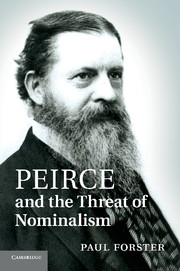Book contents
- Frontmatter
- Contents
- Preface
- List of abbreviations
- 1 Nominalism as demonic doctrine
- 2 Logic, philosophy and the special sciences
- 3 Continuity and the problem of universals
- 4 Continuity and meaning: Peirce's pragmatic maxim
- 5 Logical foundations of Peirce's pragmatic maxim
- 6 Experience and its role in inquiry
- 7 Inquiry as self-corrective
- 8 Theories of truth: Peirce versus the nominalists
- 9 Order out of chaos: Peirce's evolutionary cosmology
- 10 A universe of chance: foundations of Peirce's indeterminism
- 11 From inquiry to ethics: the pursuit of truth as moral ideal
- Bibliography
- Index
3 - Continuity and the problem of universals
Published online by Cambridge University Press: 28 April 2011
- Frontmatter
- Contents
- Preface
- List of abbreviations
- 1 Nominalism as demonic doctrine
- 2 Logic, philosophy and the special sciences
- 3 Continuity and the problem of universals
- 4 Continuity and meaning: Peirce's pragmatic maxim
- 5 Logical foundations of Peirce's pragmatic maxim
- 6 Experience and its role in inquiry
- 7 Inquiry as self-corrective
- 8 Theories of truth: Peirce versus the nominalists
- 9 Order out of chaos: Peirce's evolutionary cosmology
- 10 A universe of chance: foundations of Peirce's indeterminism
- 11 From inquiry to ethics: the pursuit of truth as moral ideal
- Bibliography
- Index
Summary
Peirce rests his critique of nominalist metaphysics on his theory of inquiry. He sees no hope of resolving the ontological question of whether the nominalist is right in thinking individuals exhaust reality in the absence of a clear method. While he recognizes that questions in the science of inquiry are no less difficult than those in metaphysics, he believes they are more tractable since they can be solved by means of diagrammatic reasoning – reasoning that, on his view, yields results that are evident to any attentive observer and, thus, provides as rigorous and neutral a ground as there can be in philosophy.
While nominalism is an ontological doctrine, Peirce thinks it implies a view of the meaning of general signs. He thinks that if nominalism is true and only individuals exist, then assertions that seem to imply the reality of laws and general kinds must be viewed as either translatable into claims about individuals or as useful fictions, that is, as conceptual tools that summarize or organize knowledge claims rather than represent features of reality. Either way, he thinks the nominalist is committed to the view that the cognitive content of a knowledge claim is exhausted by some set of claims about individuals and their particular traits.
Peirce objects that the nominalist's construal of laws and general concepts fails to provide an adequate understanding of the concept of continuity.
- Type
- Chapter
- Information
- Peirce and the Threat of Nominalism , pp. 42 - 63Publisher: Cambridge University PressPrint publication year: 2011



